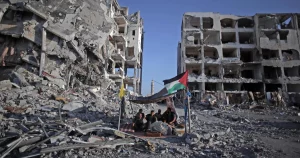In memory of Mona Mahmoud, a presentation was made on 18 June at an event co-organised by the Centre for Migration, Refugees and Belonging, University of East London, the International Centre for Eritrean Refugees and Asylum Seekers, and UAI in the UK. Founding member of UAI in the UK, Mona succumbed to Covid-19 in April this year. Mona was tireless in her commitment to end the inhumanity that characterises contemporary armed conflict and erosion of the global asylum regime.
The history of humankind is a paradoxical one. On one hand, it has been characterised by endless violence, persecution, enslavement and exploitation. On the other hand, individuals, communities and states have, over the centuries, sought to spare people from these different forms of inhumanity and to provide them with protection when their lives and liberty are at risk.
In this context, the principle of asylum has played a particularly important role. While often associated with the period since the end of the Second World War, when the UN Refugee Convention and UNHCR were established, the notion that people should be able to escape from danger and find a safe sanctuary elsewhere has a much longer history. It is to be found in every part of the world, in all of the great religious traditions and in many strains of secular philosophy. It is a principle that has not only saved millions of lives, but which has also enabled exiled people throughout the world to realise their potential, fulfil their aspirations and contribute to the societies in which they have found refuge.
We should not view the principle of asylum through rose-tinted spectacles. There was never a ‘golden age’ of refugee protection. Governments have always flouted international refugee law when it suited them to do so, and their asylum policies have often been strongly influenced by national interest and foreign policy considerations. As an organisation founded, funded and governed by states, UNHCR is often reluctant to hold governments to account when they violate refugee protection principles, and has few tools at its disposal to do so, other than persuasion and publicity. In these respects, the international refugee regime, established in its current form 75 years ago, has always had its constraints and limitations.
But those constraints and limitations have become especially acute in the past five years – so acute, in fact, that we now have to contemplate the question posed in the title of this article: are we witnessing the end of asylum? Sadly, there are reasons to think that this might be the direction in which the world is heading.
In terms of the international environment, the current outlook for refugee protection has arguably never been bleaker. The UN Security Council has become increasingly dysfunctional, while the notions of global governance, multilateralism and international cooperation are being challenged by a variety of powerful states and authoritarian leaders who also share a common disdain for human rights and humanitarian law. Such circumstances will make it exceptionally difficult to prevent new refugee emergencies from erupting and to resolve those refugee situations that already exist.
At the same time, there is mounting evidence to suggest that governments have a declining commitment to the notion that victims of persecution and armed conflict should be able to find refuge beyond the border of their own country. It is now common practice for states to prevent refugees from fleeing their homeland and to obstruct their efforts to seek safety elsewhere. Refugee policies in the Global North (Australia, the EU and the USA) are increasingly based on the notion of ‘externalisation’, whereby the task of migration control, including interception, forced return and arbitrary detention, is outsourced to failing or authoritarian transit states in the Global South.
The current weakness of the international refugee regime and its ability to uphold the principle of asylum has been exacerbated by two additional considerations. On one hand, a large proportion of the world’s refugees are now to be found in countries which are not signatories to the Refugee Convention. This includes the Middle Eastern states that host some five million Syrian refugees, as well as Bangladesh, which hosts a million Rohingya refugees from Myanmar.
On the other hand, the USA, which has traditionally acted as a mainstay of the international refugee regime, has in recent years set a highly negative example to the rest of the world by exhibiting an overt hostility to the notions of asylum, refugee protection and solutions. It has slashed its refugee resettlement quota, made it increasingly difficult for asylum seekers to claim refugee status on US territory, and has withdrawn all of its funding from entirely UNRWA, the UN agency established in 1948 to assist Palestinian refugees in the Middle East.
While the US continues to be the single largest contributor to the UNHCR budget, providing some 40 per cent of its financial resources, the organisation is clearly anxious that such funding will diminish in the future, especially if President Trump is re-elected. To make up for the consequent shortfall, UNHCR would have little choice but to turn to other major donors, especially the European Union and its member states. But that is also highly problematic, given the EU’s increasingly restrictive refugee and migration policies, epitomised by the deals that it has done with states such as Turkey and Libya, and which are explicitly designed to obstruct the movement of asylum seekers who are on route for Europe.
The international community’s response to the refugee issue has not been entirely negative. Indeed, over the past five years, the UN has made a concerted effort to review and revise its response to the refugee issue, most notably through initiatives such as the Global Compact on Refugees, the Comprehensive Refugee Response Framework and the Global Refugee Forum. But will these initiatives really uphold the principle of asylum and strengthen the international refugee regime? Again, it is difficult to be optimistic.
The Global Compact on Refugees, for example, has a number of important limitations. It is non-binding and does not impose any specific obligations on the countries that endorsed it, especially in the area of responsibility-sharing. The Compact makes numerous references to the need for long-term and developmental approaches to the refugee problem, But it is much more reticent on basic protection principles such as the right to seek asylum, the notion of non-refoulement and the norm that refugee repatriation should only occur in a voluntary manner. It has, moreover, not been endorsed by the USA.
Since the Global Compact on Refugees was established some 18 months ago, the pressures on the principle of asylum and the refugee regime more generally have been intensified significantly by the COVID-19 pandemic. As well as constituting a direct threat to the lives of refugees, especially those living in camps and informal urban settlements, the coronavirus seems likely to divert scarce resources from other humanitarian programmes, including those that support refugees.
Even more seriously in terms of the principle of asylum, the COVID-19 pandemic has provided a plausible alibi for governments that are determined to close their borders and exclude refugees. To its credit, UNHCR has provided states with practical suggestions as to how they can manage their borders effectively and minimise health risks, while simultaneously upholding the right to seek asylum. But it is not at all certain that states will have the capacity or the will to adopt such an approach, especially if, as now seems certain, the US withdraws its funding from the World Health Organization.
Addressing this situation is not going to be easy, even if the pandemic is quickly eradicated or brought under control. With states in the Global North pursuing increasingly restrictive asylum policies, there is a very real risk that they will be emulated by countries of the Global South, where 85 per cent of the world’s refugees are to be found. Indeed, this trend has already been witnessed in the Middle East, where countries which initially pursued generous policies towards Syrian refugees have progressively closed their borders. A similar process appears to be taking place in relation to those Latin American countries that have admitted large numbers of Venezuelans.
While this scenario is undoubtedly a gloomy one, there is also room for cautious optimism. Some countries – including Canada, Germany and Uganda, have set a positive example for the rest of the world by pursuing relatively progressive refugee policies. The Global Compact on Refugees and Comprehensive Refugee Response Framework may yet yield positive results in terms of refugee protection and solutions, especially if the World Bank and other development actors engage with the issue of human displacement in the concerted way that they have promised to do.
While the last few years have witnessed several setbacks in terms of the asylum policies pursued by states, there has been a surge of civil society interest in the refugee issue, epitomised by the worldwide Refugees Welcome movement and the growth of community-sponsored refugee resettlement programmes. And the establishment of organisations such as United Against Inhumanity have demonstrated a new awareness that the refugee issue cannot be effectively addressed in isolation from the broader issues of human rights, international humanitarian law and the protection of civilian populations.
The events of June 2020 have demonstrated that public opinion and popular mobilisation continue to act as vital sources of political and social change. The murder of one African-American man by the police in Minneapolis has galvanised a global movement that is determined to eradicate the inhumanity that derives from racism and systematic ethnic discrimination. We must now seek to ensure that similar levels of energy and enthusiasm are brought to bear on the issue of asylum, thereby obliging states and other stakeholders to recognise that ‘refugee lives matter’.
This Opinion piece was penned by Jeff Crisp, Refugee Studies Centre, University of Oxford.
Views expressed in this opinion piece do not necessarily reflect those of UAI.
Photo credit ©UNHCR











